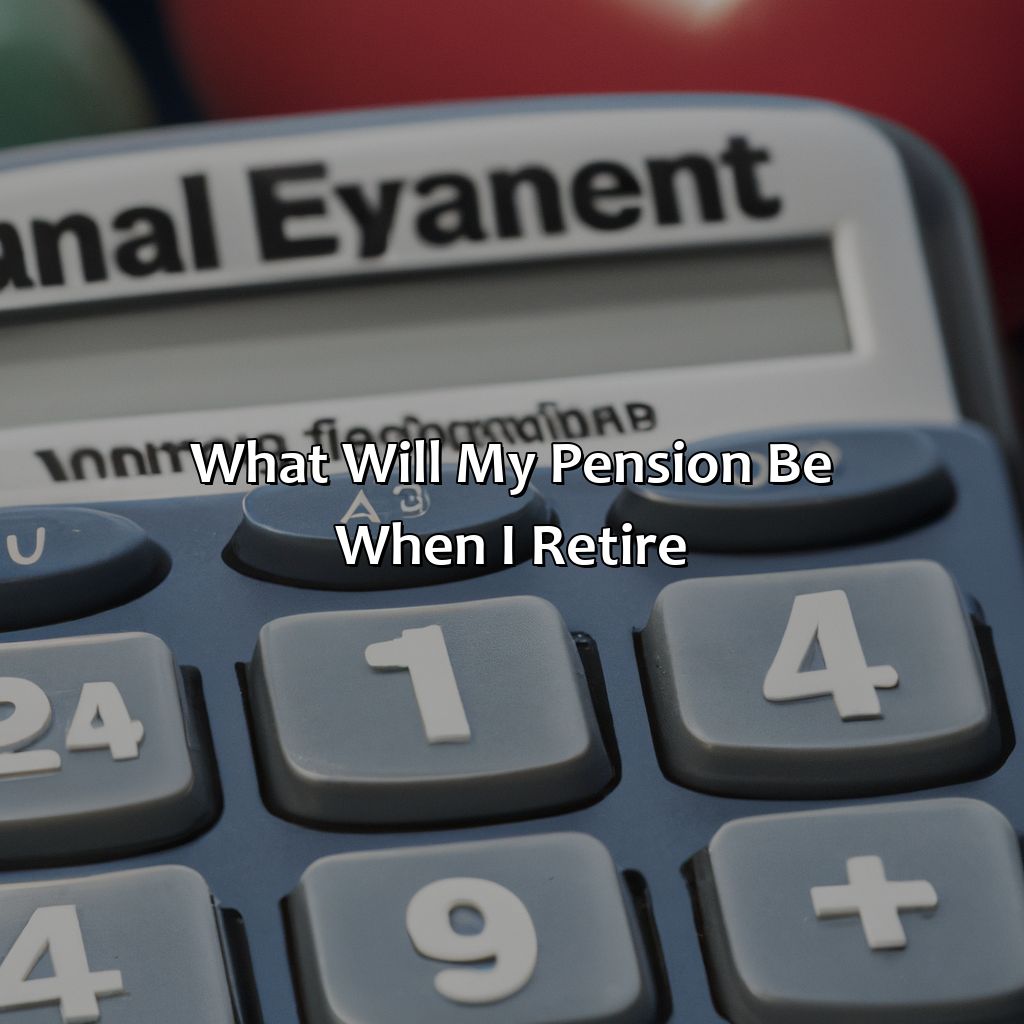What Will My Pension Be When I Retire?
Key Takeaway:
- Understanding pension: It is important to know what pension is, how it works and how it can support your retirement lifestyle.
- Factors that affect pension calculation: Service length and contributions, average salary, and pension plan type all play a role in how much your pension will be when you retire.
- Pension calculator: By using a pension calculator, you can estimate how much you will receive in pension benefits. This tool can help you plan for retirement and make informed financial decisions.
Do you worry about how you ll make ends meet when you retire? It’s important to know what your pension income could be so that you can plan ahead. You ll be surprised to learn how much of a difference small changes can make to your future pension income.
Understanding Pension
Pension Fund Clarity Explained
Pensions are a crucial aspect of financial planning. Before retirement, it’s vital to understand how to get a pension and how much you’ll receive upon retirement. Typically, the pension amount is dependent on factors such as the number of years worked, salary, and contribution rate. It’s imperative to understand how these factors impact pension earnings.
Understanding the pension fund requires knowledge of contributions, investment performance, and pension earnings potential. A good pension plan can provide financial security and stability during retirement. A pension calculator can be utilized to estimate pension earnings for different retirement age scenarios. Additionally, it’s important to monitor your pension performance regularly to ensure that it’s on track to meet retirement goals.
Furthermore, being aware of how to withdraw from pension and how pension contributions can be maximized can ensure that you receive the maximum benefit upon retirement. This includes things like taking advantage of employer contributions, ensuring that all eligible earnings are included, and taking steps to increase contributions.
A recent study conducted by the National Institute on Retirement Security found that only 40% of workers have access to a defined benefit plan, which was once more commonly offered. This highlights the importance of understanding pension funds and taking steps to ensure a comfortable retirement.
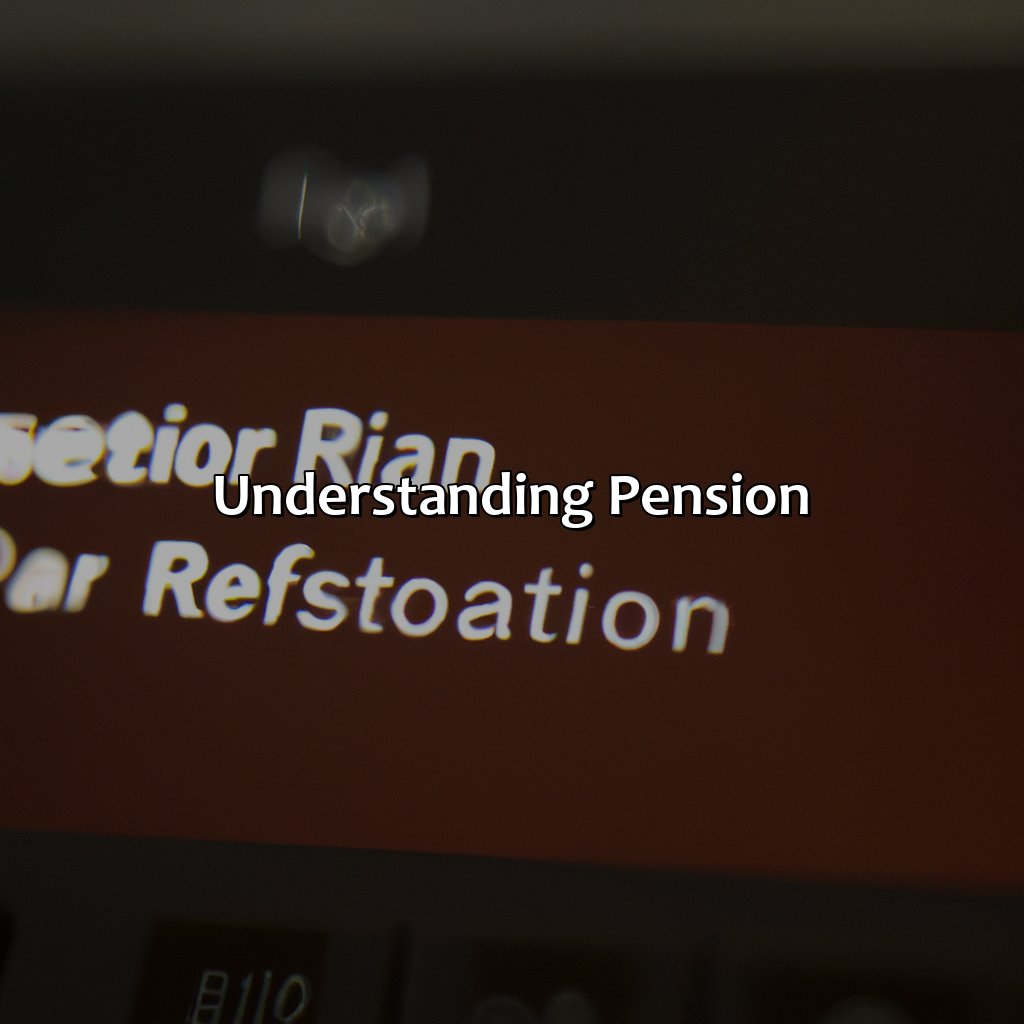
Image credits: retiregenz.com by Adam Duncun
Factors that Affect Pension Calculation
To work out your pension when you retire, you need to know what affects it. Get to grips with the average salary, the type of pension plan, and your length of service and contributions. This will help you figure out your retirement income.
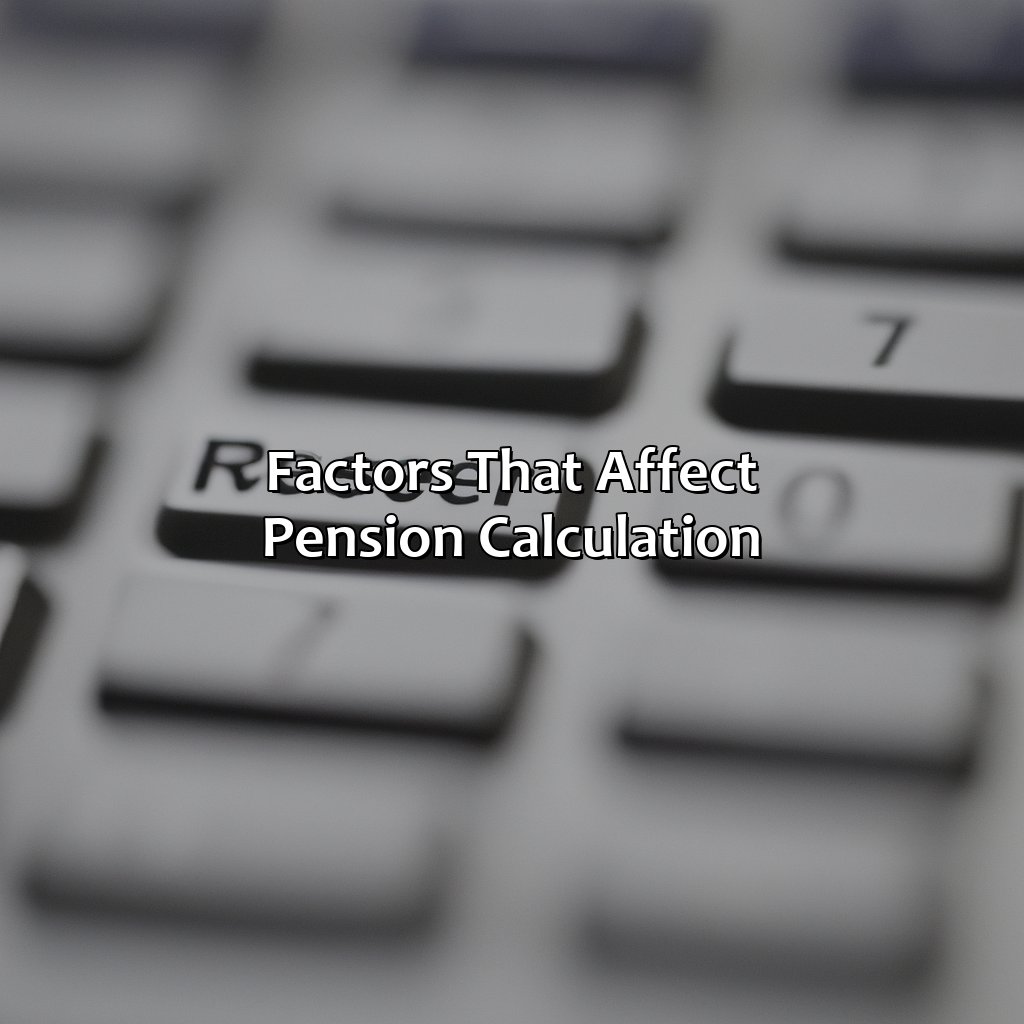
Image credits: retiregenz.com by Adam Duncun
Service Length and Contributions
Contributions and years of service’s impact on pension calculation is substantial. Based on how long you have worked and how much you have contributed, your monthly pension benefits can vary greatly.
| Service Length | Monthly Pension Benefit |
|---|---|
| Less than 5 years | May not qualify for a pension benefit |
| 5-10 years | Lower amount of monthly pension benefit |
| 10-20 years | Moderate to satisfactory amount of monthly pension benefit |
| 20+ years | Highest level of monthly pension benefit possible based on other contributing factors. |
Other factors such as age at retirement, interest rates, the type of plan selected, and final average salary play a minor role in determining the amount you are entitled to.
It is interesting to note that contributions made towards your plan aren’t always dollar-for-dollar when it comes to building your retirement savings. Depending on what kind of plan you signed up for, the company can match a portion or all of what you contribute or use a predetermined contribution structure.
In the past, there have been situations where employees’ benefits were transformed into lump sums rather than an ongoing stream of payments. This was done in cases when the company wanted to free themselves from accrued liabilities.
Overall, understanding how both service length and contributions affect your pension calculation is essential if you wish to optimize your retirement investments. Your salary may be average, but your pension calculation skills better be above average if you want to retire comfortably.
Average Salary
The compensation of an employee refers to their remuneration in various forms such as basic pay, bonuses and allowances. The aggregate of these values is referred to as the Compensation Package. This value is essential in determining the pension of an individual. A high compensation package will result in a higher pension while a low compensation package results in a lower pension.
In calculating a person’s retirement benefits, the average salary earned over a period of time, usually the years worked for the employer, plays an important role. This number is used to determine the base amount of pension payable to an individual upon retirement. The average salary differs from the actual salary because it eliminates the variation that occurs due to bonuses and promotions.
If you’re wondering how much your social security benefits will be reduced if you have a pension, you can use online tools to estimate your actual amount.
To accurately calculate one’s final pension sum, factors such as age at retirement, years of service and contribution made throughout employment are crucial and must be taken into account.
Pro Tip: It is important for individuals to stay informed about their company s policies regarding pensions contributions so they can make informed decisions about their financial future. A pension plan type can determine your retirement fate, so choose wisely or end up playing shuffleboard with your old boss at the retirement home.
Pension Plan Type
Pension Scheme Varieties
Pension plans are not one-size-fits-all. The type of pension plan you choose significantly impacts the amount of your retirement income. Here are five varieties to consider:
- Defined-Contribution Pension Plan: You contribute money, and your employer might also add funds. Your pension depends on the account balance when you retire.
- Defined-Benefit Pension Plan: This plan guarantees a certain amount annually based on years of service and salary history.
- Cash Balance Plans: Combines elements of defined-contribution and defined-benefit plans.
- Solo 401(k) Plan: Designed for small business owners or self-employed individuals, allowing them to contribute as both an employer and employee.
- Simplified Employee Pension (SEP) plan: Simplified way for small business employers to make contributions toward their employees’ retirement savings.
Your choice is critical to think about because some types provide better benefits, while others have flexibility.
Lastly, ensure that you take advantage of the employer-sponsored scheme if available. Pensions are an essential part of anyone’s retirement planning journey; don’t let a hasty decision affect your deserved benefits. If you’re wondering how much you should pay into your pension, consult a financial advisor for personalized advice.
Now you can calculate your pension and plan just how many years you’ll need to work past retirement age to afford those avocado toast brunches.
Pension Calculator
Use the Pension Calculator for precise and effective pension calculations. This tool estimates future pension income and considers various factors. Here, we’ll explain how to use it and its benefits. Get the most out of it!
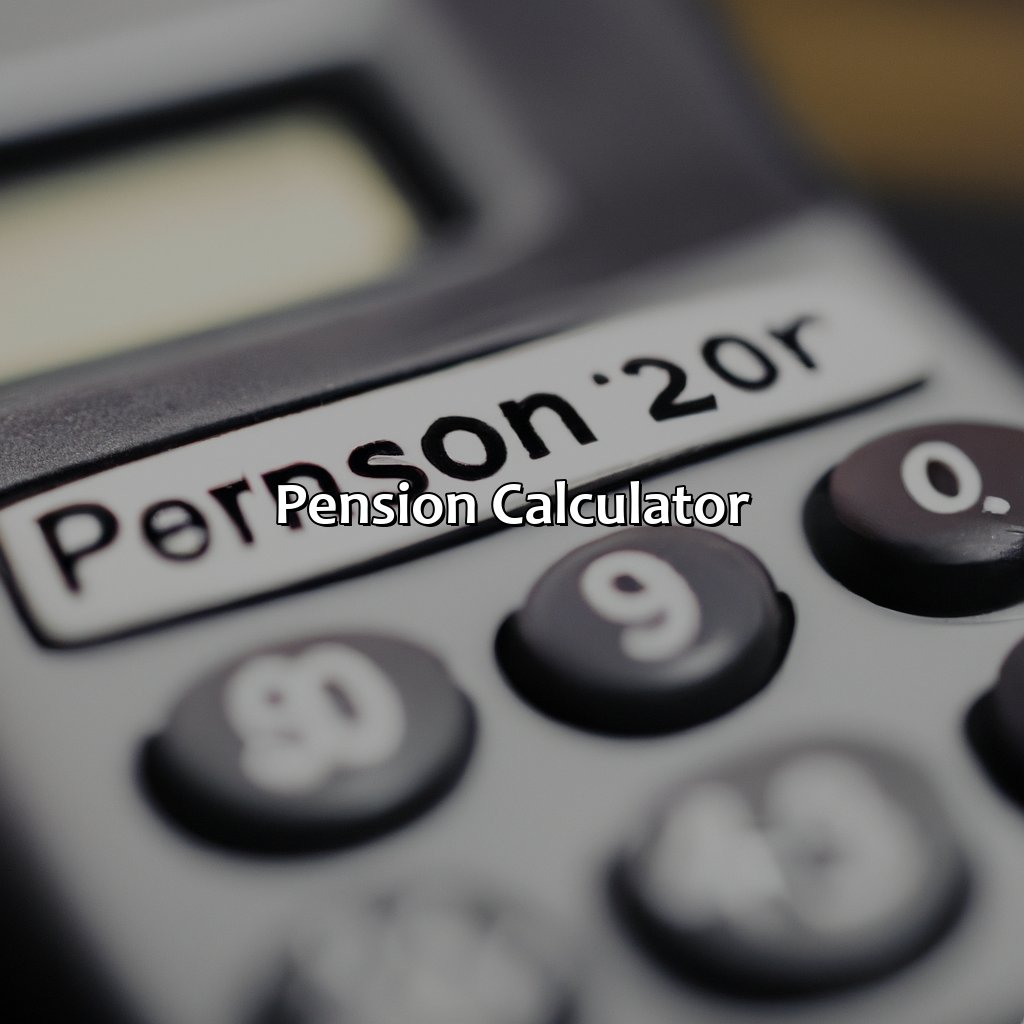
Image credits: retiregenz.com by Harry Woodhock
How to Use the Pension Calculator
Understanding the Pension Calculator is crucial in determining an individual’s retirement plan efficiently. Here’s a concise guide on how to navigate the Pension Calculator seamlessly.
- Input your current age and retirement age you aim to achieve.
- Select your current income level as well as estimate your future salary per annum.
- Specify any relevant pension contributions from yourself or employer.
- Consider additional sources of income like rental property or dividends if necessary.
- The Pension Calculator will provide an estimated monthly pension amount and the total worth of pensions saved up until retirement.
- You may adjust individual details such as retirement age and salary to analyze different pension scenarios, check out how to perform various prediction scenarios with this tool at different ages & levels for even more insights into what you can expect from it!
It is essential to understand that there is no one-size-fits-all solution when it comes to planning for retirement, making the Pension Calculator an excellent tool that accounts for individuals’ specific needs.
Pro Tip: Use the calculator periodically while contributing regularly to ensure that you are still on track towards meeting your financial objectives.
Finally, a calculator that makes retirement planning less confusing than a Game of Thrones plot.
Benefits of Using a Pension Calculator
Pension Calculator- Anticipating Retirement Finances
Your retirement planning can be well-refined by using a pension calculator.
- Get an estimation of your post-retirement income based on your present earnings, contribution, and work experience.
- Analyze options to optimize contributions and be prepared for unforeseeable events.
- Evaluate the potential benefit from your existing pension plan and investment schemes using real-time market fluctuations.
- Receive a streamlined illustration of retirement payouts in different scenarios like minimal investment timeframes or adjusting withdrawal age range, making informed financial decisions easy.
- Encourages people to start contributing earlier, showing them how much more returns they get with each passing year.
In addition to this great functionality, the application provides useful insights such as projected post-work expenditure needs based on inflation rates.
Having an idea of what kind of life awaits them after retirement can be extremely reassuring for people; therefore, it is imperative that you do not miss out on such significant tools for planning their future finances effectively.
Investing time & effort now in securing your financial future ensures you face no uncertain conditions later when you are unable to afford relevant assistance. However, if you are looking to opt out of pension, it is important to consult a financial advisor to understand the implications and alternative options available to you.
Who needs other retirement income sources when you can just become a professional bingo player?
Other Retirement Income Sources
In addition to your pension benefit, there are various sources of retirement income. Social Security benefits may supplement your pension payouts, but if you have a high income, you may receive less in Social Security benefits. Additionally, retirees may receive income from investments, rental properties, or part-time employment. It’s important to plan and budget for these supplementary sources of income to ensure financial security in retirement.
Furthermore, managing your retirement income sources can require a careful balancing of risks and rewards. For instance, investing in stocks may result in higher returns, but may also involve greater market risk. On the other hand, conservative investments like bonds or CDs may yield more stable returns but provide less growth. It is crucial to consult with a financial advisor to ensure that you know what to do with your pension when you change jobs and have a well-diversified portfolio that meets your income needs and risk tolerance.
In light of recent economic changes, some retirement income sources may fluctuate unexpectedly. For example, rental income may decrease if tenants lose their jobs due to a recession. It’s important to have contingency plans for such scenarios and maintain an emergency fund to cover unexpected expenses or reductions in income. Learn more about how to retire without a pension to be fully prepared for your retirement.
In the past, some retirees relied heavily on pension benefits as their primary source of retirement income. However, pension plans have become less common in recent decades, and many companies have shifted to defined-contribution plans, such as 401(k)s, that place more responsibility on employees to save for retirement. It is crucial to plan and save for retirement early on in your career to ensure that you have sufficient resources to support your desired lifestyle in retirement.
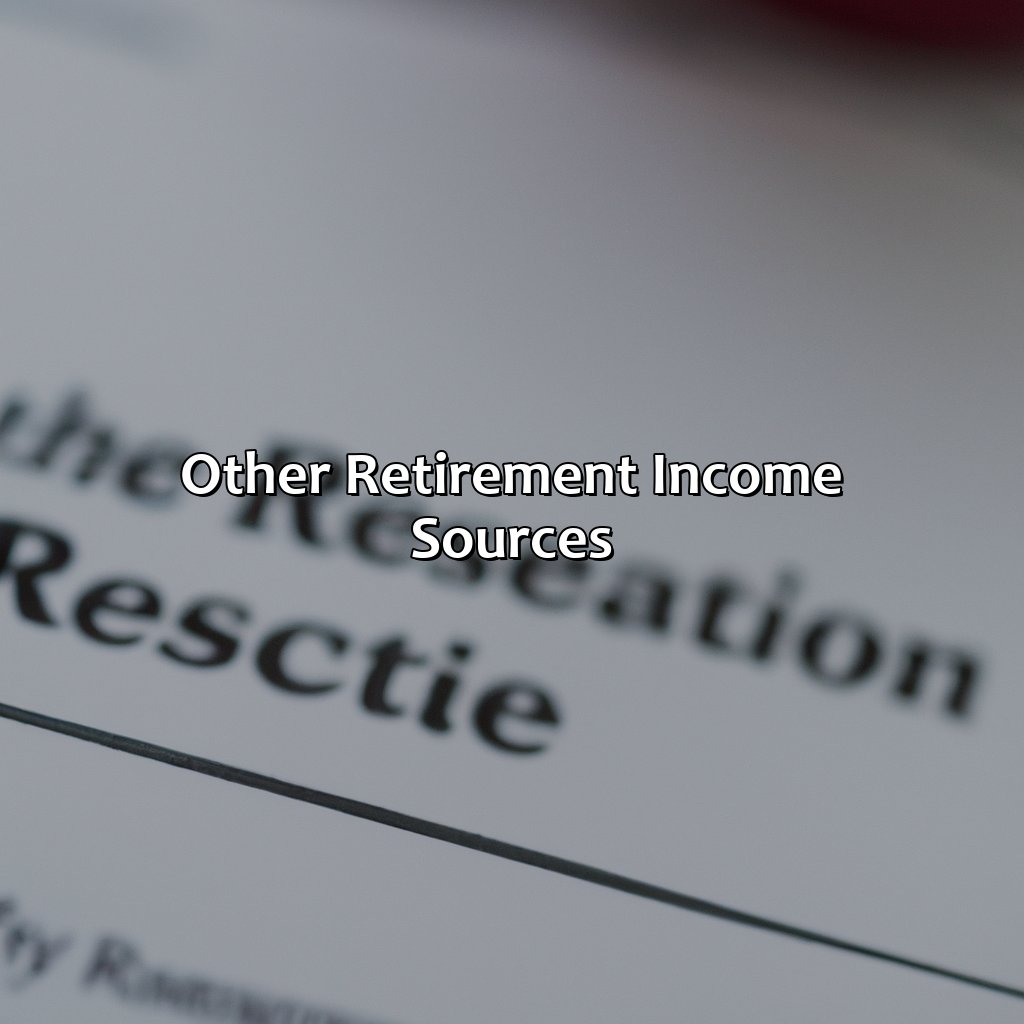
Image credits: retiregenz.com by Yuval Jones
Pension Payment Options
Pension Payment Options:
Selecting the ideal pension payout option is essential in determining your future finances. It’s crucial to consider factors such as tax implications and longevity risk. Choosing a single or joint life annuity with a lump sum payout or a fixed-term annuity can provide peace of mind, focusing on your needs and potential beneficiaries. Additionally, review the options to pass on any unused pension funds to realize the full value of your savings.
Pro Tip: Consult with a financial advisor to make informed decisions that reflect your retirement goals and present financial position.

Image credits: retiregenz.com by Adam Jones
Pension Planning Tips
Pension Planning Tips:
Planning for retirement can be a complex process. One pivotal aspect of planning for retirement is pension planning. Below are tips to aid in pension planning:
- To begin with, determine the amount of income you will need during retirement. Evaluate your expenses based on your current standard of living to determine this amount.
- Explore pension plan options to determine which will provide the best benefits and reduce tax liabilities. Consider investments in a Roth IRA or a 401(k) plan to maximize retirement savings.
- It’s crucial to start investing early to allow compounding to work in your favor. Take advantage of employer-matching contributions, if available.
- To be successful, consider working with a financial adviser or pension plan specialist. They will provide critical advice and devise a tailored plan that aligns with your retirement goals.
Ultimately, successful pension planning requires careful consideration of multiple factors. By applying these tips, you can determine the right pension plan and achieve your retirement goals.
If you are wondering what was the primary purpose of the Pension Protection Act of 2006, it was to encourage employers to create pension plans and protect the rights and interests of pension participants.
Pro Tip: Stay updated, monitor your pension plan periodically, and adjust investment strategies if necessary.
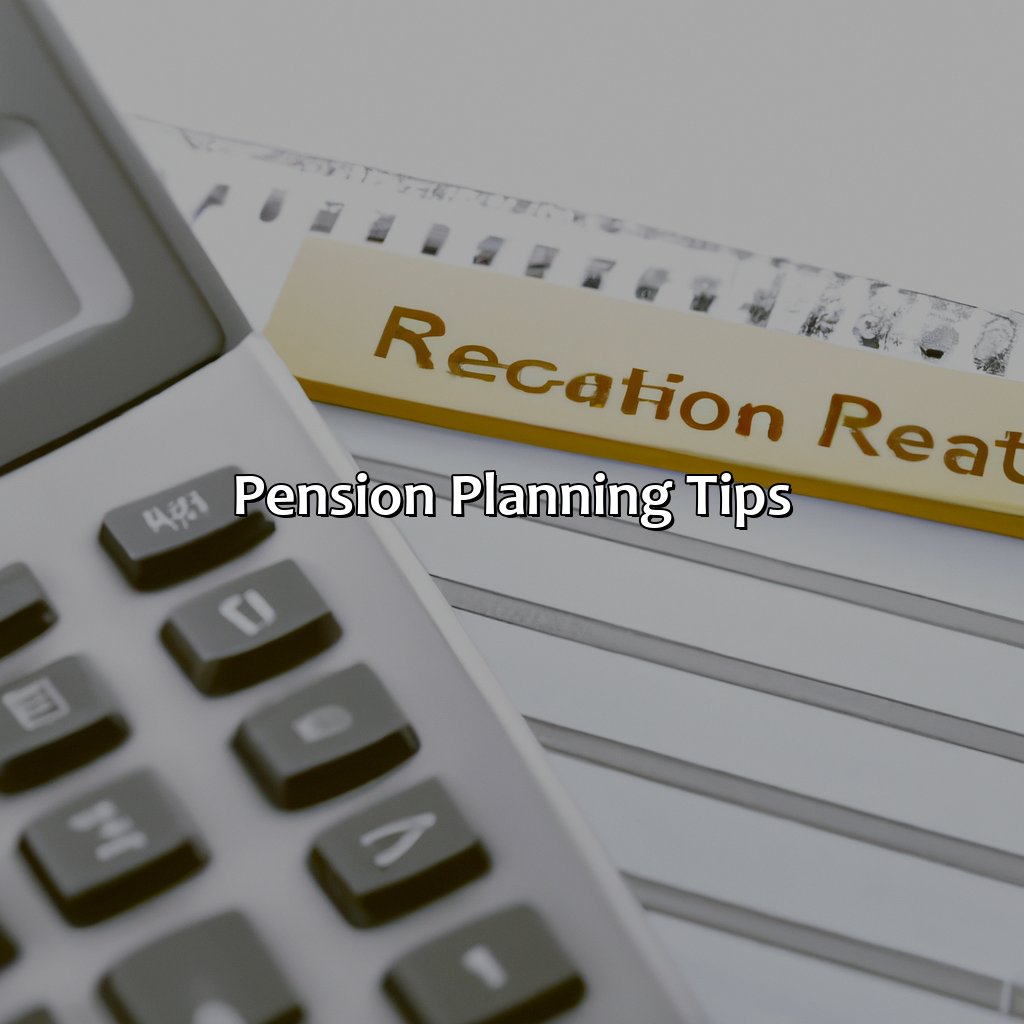
Image credits: retiregenz.com by Joel Woodhock
Five Facts About “What Will My Pension Be When I Retire?”:
- ✅ Your pension amount depends on multiple factors, such as your age, salary, and the type of pension plan you have. (Source: The Balance)
- ✅ Planning for retirement early can help increase your pension amount through contributions and investments. (Source: Investopedia)
- ✅ Social Security benefits may also factor into your retirement income, as they provide a base amount of monthly income. (Source: AARP)
- ✅ Pension plans can be either defined benefit plans, which offer a specific benefit amount, or defined contribution plans, which offer contributions made by both employees and employers. (Source: Fidelity)
- ✅ Knowing how much your pension will be can help you plan for retirement and adjust your savings and investment strategy accordingly. (Source: The Street)
FAQs about What Will My Pension Be When I Retire?
What factors determine what my pension will be when I retire?
Several factors determine what your pension will be when you retire:
- Your employment history, including the number of years you worked, your salary, and if you were part of a pension plan
- Your retirement plan, including the type of plan and how it’s structured
- Your age at retirement
- Whether you choose a lump-sum payout or a regular annuity payment
- Inflation and any cost-of-living adjustments included in your retirement plan
How can I estimate what my pension will be when I retire?
There are several ways you can estimate what your pension will be when you retire:
- Use an online retirement calculator to input your retirement plan information and estimate your pension payout
- Review your annual pension statements to see how much you’re accruing each year and estimate your payout based on that information
- Speak with a financial advisor who can analyze your retirement plan and provide a personalized estimate of your pension
If I change jobs, what happens to the pension plan I’m currently in?
If you change jobs, your pension plan may be affected in the following ways:
- If your new employer offers a pension plan, you may be able to transfer your funds from your old plan into your new plan
- If your new employer doesn’t offer a pension plan, you may be able to roll over your funds into an Individual Retirement Account (IRA)
- If you leave your funds in your old pension plan, they will continue to accrue interest until you reach retirement age or withdraw the funds
Can I increase my pension payout before I retire?
Yes, there are several ways you can increase your pension payout before you retire:
- If your employer offers a matching contribution to your pension plan, consider contributing more to maximize the match
- If you have a traditional pension plan, consider working longer to increase your years of service and salary, which will increase your pension payout
- If you have a defined contribution plan, make sure you’re investing aggressively to maximize your contributions and investment returns
Can my pension payout be impacted by external economic factors?
Yes, external economic factors can impact your pension payout, including:
- Inflation, which can reduce the purchasing power of your pension over time
- Changes to interest rates, which can impact the value of your pension investments and the amount you receive in interest
- Market volatility, which can impact the value of your pension investments and the overall financial health of your plan
- The solvency of your pension plan, which can impact whether your pension payouts are guaranteed or subject to reduction
